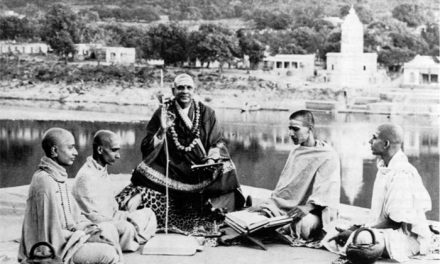Query: Is this asceticism? The answer is – No, there is a stage beyond this as well.
tatparam purushakyatergunavaitrishnayam ||16||
Word meaning: tat – that; pararn – different asceticism, which; pusrushkhyte – when meets with the person; gunavetrushnam – the thirst is quenched.
Summary: It is the highest stage of asceticism, which is relieved from satva, raj and tama qualities when the soul meets with its self.
Purport: Our soul is like a water body full of waves, in which the waves of purity, anger and passion raise and visions related to beauty and taste appear. When yogi sees the consequences and unhappiness causing subjects he looses the interest in those subjects. The visions related to those subjects do not appear in the mind. However the waves of purity, anger and passion arise in the mind. In spite of the waves of purity arising in them and; the mind free of external thoughts becomes so pure that the soul experiences itself through the medium of pure mind. The separation of soul from itself is called attainment of wisdom. With the experience of separation of soul from itself the feelings of purity, anger and passion separate from the mind. This feeling of detachment is called asceticism.
vitarkavicaranandasmitarupanugamat ||17||
Word meaning: Vitarka-vichar-anand-asmitarupanugamat – exit of the circumstances of reasoning – thoughts – happiness and pride from the mind is called contemplation accompanied with idol.
Summary: Exit of the circumstances of reasoning – thoughts – happiness and pride and the removal from conditions of the mind is called the contemplation accompanied with idol.
Purport: Concentration of mind has deep meaning. It means:
dhyeyavijayaka – ekagratayam dhyeyavijayah samyakprakarena
prakarena jnayate yatra sa samprajnatah
In other words the concentration of mind towards one subject or goal is called stage of deep meditation. There are four stages of deep meditation – arising from reasoning, thoughts, happiness and pride.
We can understand these stages in the following way when the devotee embraces a broad subject and tries to concentrate on it then the mind becomes free from these subjects and the broad subject tries to find harmony with its broad form. This contemplation accompanied with idol is called the one arising from reasoning. When the concentration focusing on a particular subject increases the devotee begins to understand the minute details with respect to the subject, this stage is said to arise from thoughts. When the concentration increases further the pride dominated with purity gives happiness in the mind this contemplation accompanied with idol is said to arise from happiness. When the concentration increases even further the devotee experiences pride and this contemplation accompanied with idol is called the one arising from pride:
viramapratyayabhyasapurvah samskarashesho ‘nyah ||18||
Word meaning: Virampra-tyabhyasapurva – viram – regular practice of the resources helpful in removing conditions of mind and the final stage of contemplation accompanied with idol arising there from, that; Sanskarshesha: the stage is purely containing values and is different from the contemplation accompanied with idol mentioned above.
Purport: Regular practice of the resources helpful in removing conditions of mind and the contemplation accompanied with idol arising there from, that; Sanskarshesha: the stage is purely containing values and is different from the contemplation accompanied with idol mentioned above.
The sources of removing the conditions of the mind are called stoppage in the philosophical terms. Regular practice of these sources first leads to contemplation accompanied with idol, under which the stages arising from reasoning, thoughts etc, have been mentioned. Continuous practice of these stages leads to the contemplation accompanied with idol mentioned in the prose, which contains only values. In order to differentiate this stage from the one mentioned in earlier stage we could call it contemplation without the use of idol i.e., the highest contemplation.












